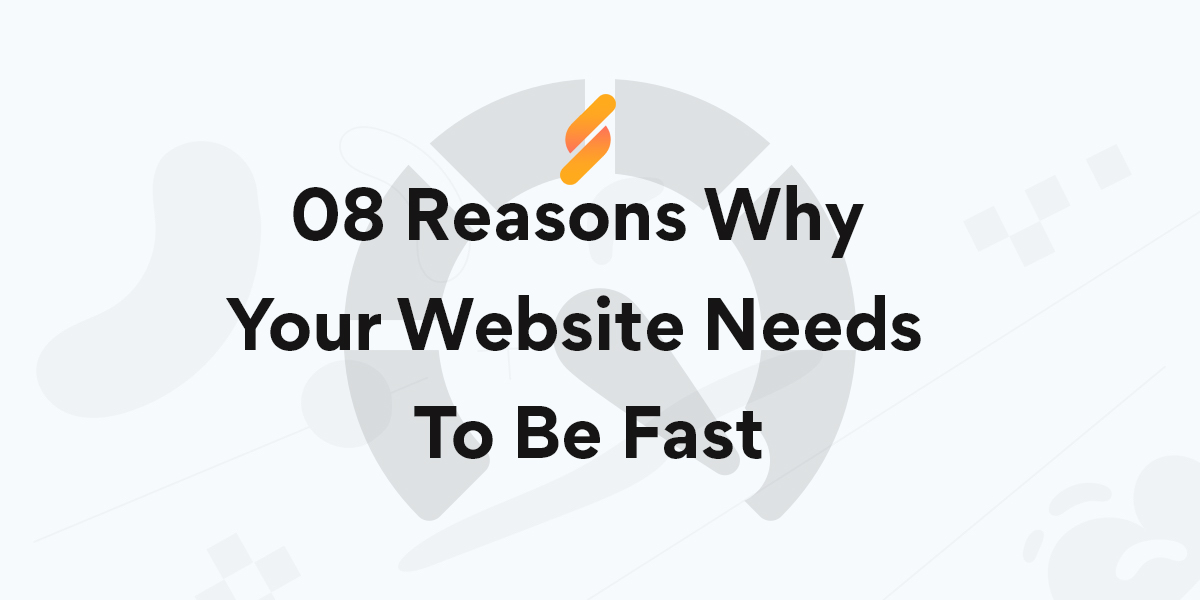In the early days of the internet, users would not mind waiting even five minutes for a simple webpage to load. I still remember browsing Yahoo on a dial-up connection and downloading my favorite song off the internet in 15 to 20 minutes after a couple of failed attempts.
Fortunately, those days are gone with the internet becoming faster very rapidly. Nowadays, users expect websites to load not in minutes but in a couple of seconds at tops. Speed has become a new norm in the realm of the World Wide Web, and slow websites will eventually find it challenging to stay profitable.
Two thirds (67%) of the UK and more than half of US shoppers (51%) cited slow loading times as the top reason they’d abandon a purchase
Brand Perfect Retail Survey
What does it tell you? Performance matters to running an online business successfully. The Internet is only going to get faster, and users will adapt to it and expect the websites to load as quickly as possible. Let’s look at some of the essential reasons in detail for having a faster website.
Table of contents
1. User-experience
I placed this as the number one reason because the user experience gets affected the most if your website does not load fast. No matter how aesthetically appealing your site is, if it is sluggish, the visitors find it annoying to move around and will eventually abandon it for a better alternative. To back this up, I would suggest looking at the Google Core Web Vitals that directly speak to enhanced user experience and encourages webmasters to work on the performance of their website for an improved user experience.
Fast websites give visitors what they want fast, which leads to better satisfaction and improved user experience. Speed also improves the overall functionality of your website and gives more time and flexibility to your visitor to explore different sections of your site.
2. Better Search Engine Ranking
We are all aware of Google’s page experience, which includes Core Web Vitals, mobile-friendliness, HTTPS, safe browsing, etc, to measure the overall experience for the visitor. Page Experience is a search engine ranking factor which means it can affect the ranking of your website. And performance plays a crucial part in affecting the Page Experience metric.
A bounce rate that determines the number of users coming and then leaving your website without clicking or performing any actions is another factor that gets improved by speeding up the website. A low bounce rate is not only good for conversion but also improves the search engine ranking of your website.
Google’s search engine, among other things, ranks the website according to its loading speed. A fast website will rank higher in search queries on Google, making it easier for visitors to find your webpage. Unfortunately, still, a large number of SEO experts overlook speed and instead invest in other less cost-effective methods to improve the search engine ranking report of their website.
Our research shows 36% of UK and 44% of US consumers will turn to search engines to research a product.
Brand Perfect
The above statement is enough to show the importance of ranking higher in search engines such as Google. If you want more in-depth knowledge about how website speed can affect the SERP of your website, read the online research conducted by Moz.
3. More Website Conversions
The first milestone is reached once the customers have reached the website. The next step is to get the customer to do something while they are there. A conversion on the site may be that the customer makes a purchase, clicks on an ad, completes the contact form – or does anything else that’s of value to you. Customers visit more pages on a site that has a short load time, so there’s an increased chance of conversions if the page loads quickly.
But what happens when the website is slow? You lose sales! Let me back up this statement with some facts and figures from the survey conducted by Brand Perfect.
Speed is a major problem online buyers face when attempting to shop online, it’s clear that substantial investment in service infrastructure from operators is an essential component of online retail success.
Brand Perfect
It is evident that a slow website is a major turn-off for online shoppers who, despite finding the right products leave the website just because it is slow. The other part of the statement clearly suggests online businesses invest in provisioning high-performing infrastructure that not only speeds up their website but also can withstand high-traffic surges.
Consumers cite slow loading (64%) and difficulty in finding products (55%) as the top two irritations when shopping online.
Brand Perfect
Again, a slow-loading site is one of the biggest reasons behind customers’ irritation – and another reason why your website should load fast. Website conversion is paramount for the sustainability of any online business; that can easily be improved by speeding up the website. As indicated in the survey, your web host plays an important role in delivering fast pages. Therefore, it is also important to switch to an optimized managed web hosting that can deliver the high-performance.
4. Customer Retention
Businesses spend a reasonable amount of time and resources figuring out how to retain their customers. Which by all means is justified as returning customers means recurring revenue. The cost of business is fairly less with returning customers, which simply improves profitability.
People will visit a site less often if it is slower than a close competitor by more than 250 milliseconds.
Brand Perfect
A very major factor in customer retention is the performance of your website. If you think you have a great product/service and, irrespective of your site performance, you would still make money and rank higher in searches, then I am afraid you are delusional. A study conducted by Google way back in 2009 shows that 400 ms or just a blink of an eye! is too long for the visitors to wait for the page to load.
It is also enough for the visitors to forget about your website and move to your competitors. If it does not worry a slow website owner, then I do not know what will.
Servebolt’s blazing-fast hosting starts at only $49/mo
5. Less Bounce Rate, More Traffic
Another great reason for having a faster website is that it attracts more traffic than a slow-loading site. Since it delivers an enhanced user experience to its visitors, people will frequently revisit it and spend more time browsing it, hence, reducing the bounce rate and increasing the conversion rate.
Similarly, faster websites get more social shares as they offer an improved user experience to a visitor, resulting in more organic traffic and lead generation. Using tools like Google Analytics, you can also monitor the behavior of an average site visitor before and after optimizing the website for speed.
A renowned web page speed test tool Pingdom conducted a study in 2017 that revealed that the bounce rate increases drastically when the web page takes only a second longer to load.

As shown in the graph above, the bounce rate was 9% for the pages loading in under 2 seconds which hiked drastically as soon as the loading time passed the 3 seconds mark and reached 38% by the time the page load time was 5 seconds. Also, an inverse proportion can be seen between the bounce rate and the number of pageviews.
6. Better Usability For Mobile Traffic
Optimizing your website for mobile users is undoubtedly the most important thing and the best thing you can do for your online business. You will be surprised to know that mobile traffic has increased 222% in the last 7 years, and according to the latest data, more than 52% of users surf the internet from mobile devices.
Why is this number increasing every year? Well, that is because mobile networks are getting faster, and so are smartphones. People are relying more on their mobile devices for mundane tasks such as searching, reading, viewing, and buying online. However, there is still a need for speed for serving mobile traffic when it comes to loading times. Mobile networks are still inconsistent and slow in many parts of the world, which can affect the performance of your website.
How fast should your website load on a mobile device? Google expects the webpage to load in under 5 seconds on 3G and faster on 4G networks. The best way to test the performance of your mobile website is to use Google’s Speed Score Card tool. This tool allows you to run a test on different mobile networks, such as 3G and 4G.

Besides telling the speed rating of your site for mobile traffic, the tool also helps you to fix the issues to improve the speed of your website further.

Speeding up your website for mobile devices can directly impact your conversion, just like it does on the desktop version. Mobile phones are the future, and if your site is not fast enough, then you are not ready for it.
7. Scalability
A slow website eats up more server resources, and when that happens, your server bloats and is incapable of serving the actual customers who are willing to pay! A fast website loads up quickly, navigates seamlessly, and serves the customer faster to become available again for the next one. This allows your website to serve more customers without any performance issues.
Another bright side of having a fast website is that it is energy efficient and consumes less computational power compared to a slow-loading bloated site.
8. Credibility
“Judge a business by its website’s loading time” is probably not a famous idiom; in fact, I just invented it. But it does not change the fact that visitors nowadays have started to notice the performance of the websites they visit, and among other elements, the website’s performance reflects the seriousness and professionalism of the people behind the scenes.
A slow-loading website shows poor planning, a non-serious attitude, and a lack of focus on the business. People simply do not want to spend their money or spend time on such websites.
At Servebolt, we are on a mission to make the internet faster and also to make our customers’ lives easier. Therefore, we recently introduced Accelerated Domains that help your webpages load ~2X faster and improve Core Web Vitals by 50%!
Wrapping Up!
Now you have 8 good reasons to back up your argument of having a faster website in front of your boss or IT manager. Speed will play an important role in challenging the competition on the World Wide Web, and businesses that are investing now will be rewarded tomorrow.


